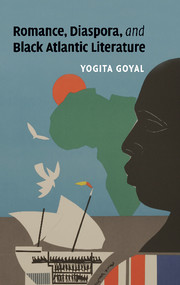Book contents
- Frontmatter
- Contents
- Acknowledgements
- Introduction: the romance of diaspora
- 1 From domestic allegory to imperial romance: Pauline Hopkins and racial mixture
- 2 From double consciousness to diaspora: W. E. B. Du Bois and black internationalism
- 3 From nativism to nationalism: Joseph Casely Hayford, Chinua Achebe, and colonial modernity
- 4 From romance to realism: Richard Wright and nation time
- 5 From revolution to arrested decolonization: Ama Ata Aidoo and the long view of history
- 6 From return to redemption: Caryl Phillips and postcolonial hybridity
- Notes
- Index
2 - From double consciousness to diaspora: W. E. B. Du Bois and black internationalism
Published online by Cambridge University Press: 04 August 2010
- Frontmatter
- Contents
- Acknowledgements
- Introduction: the romance of diaspora
- 1 From domestic allegory to imperial romance: Pauline Hopkins and racial mixture
- 2 From double consciousness to diaspora: W. E. B. Du Bois and black internationalism
- 3 From nativism to nationalism: Joseph Casely Hayford, Chinua Achebe, and colonial modernity
- 4 From romance to realism: Richard Wright and nation time
- 5 From revolution to arrested decolonization: Ama Ata Aidoo and the long view of history
- 6 From return to redemption: Caryl Phillips and postcolonial hybridity
- Notes
- Index
Summary
I know no national boundaries where the Negro is concerned.
Marcus GarveyOne could not be a calm, cool, and detached scientist while Negroes were lynched, murdered and starved.
W. E. B. Du BoisW. E. B. Du Bois's 1928 novel, Dark Princess: A Romance, is often viewed as a prescient blueprint for Third World solidarity. The novel's central concern – orchestrating a romance between a Talented Tenth hero and a mysterious Indian princess – unfolds against a dense backdrop of plans for a secret society plotting the end of white supremacy, negotiating along the way all the weighty questions of labor, electoral politics, and the possibility of unionization. Towards the end of the novel, the Indian princess of the title proclaims: “in 1952, the Dark World goes free – whether in Peace and fostering Friendship with all men, or in Blood and Storm – it is for Them – the pale Masters of today – to say.” For some scholars, this prophecy comes uncannily close to predicting the historic meeting at Bandung in 1955, where the spirit of Afro-Asian solidarity found a rare occasion to flourish. Du Bois's novel, then, becomes a sign of internationalist longings that register a turn away from white power as well as from a domestic focus on race in the United States. In the words of one critic, the novel offers a vision of “hybridity and intermixture that is especially valuable” as it ends not with “the fusion of two purified essences but rather a meeting of two heterogeneous multiplicities.”
- Type
- Chapter
- Information
- Romance, Diaspora, and Black Atlantic Literature , pp. 59 - 103Publisher: Cambridge University PressPrint publication year: 2010



